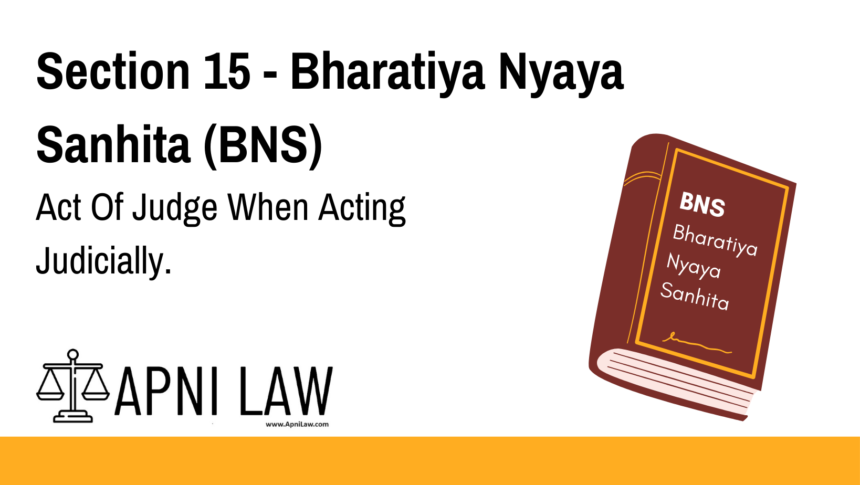Code: Section 15 BNS
Section 15 – Nothing is an offence which is done by a Judge when acting judicially in the exercise of any power which is, or which in good faith he believes to be, given to him by law.
Explanation of Section 15 BNS
1. Meaning & Purpose
Section 15 of the Bharatiya Nyaya Sanhita (BNS), 2023, grants legal immunity to judges for actions performed in a judicial capacity. This ensures that judges can perform their duties fearlessly without the fear of criminal liability, as long as they act in good faith.
2. Key Elements of Section 15 BNS
- The act must be done by a Judge.
- It must be performed in the exercise of judicial powers.
- The Judge must act in good faith, believing their actions are lawful.
- If these conditions are met, the Judge cannot be prosecuted for the act.
Illustration & Examples
Example 1: Sentencing a Person
A Judge convicts a person based on the evidence presented in court. If later, new evidence proves the person was innocent, the Judge cannot be held criminally liable, as the decision was made judicially and in good faith.
Example 2: Issuing an Arrest Warrant
A Judge issues an arrest warrant for a suspect based on the police report and legal provisions. Later, if it turns out the accusation was false, the Judge will not be criminally liable, as they acted within their judicial powers.
Example 3: Rejecting Bail Application
A Judge denies bail to an accused person, believing the law does not permit it. Even if a higher court later grants bail, the Judge is protected under Section 15 BNS, as the decision was made in good faith.
Common Questions & Answers on Section 15 BNS
1. Can a Judge be prosecuted for a wrongful decision?
No, as long as the Judge acts judicially and in good faith, they cannot be held criminally liable. However, if a Judge acts maliciously or beyond their legal authority, they may face legal consequences.
2. Does Section 15 BNS apply to all judicial officers?
Yes, this protection applies to all Judges, including those in District Courts, High Courts, and the Supreme Court.
3. What if a Judge knowingly makes an illegal decision?
If a Judge acts maliciously or deliberately misuses power, they will not be protected under Section 15. For example, if a Judge takes a bribe to pass a judgment, they can be prosecuted under corruption laws.
4. Can a retired Judge claim protection under Section 15?
If the act was performed while they were in judicial service, yes. However, any actions after retirement will not be covered under this section.
5. How does this section ensure judicial independence?
This section protects Judges from fear of prosecution for honest judicial decisions, allowing them to uphold justice without external pressure.
Conclusion
Section 15 BNS plays a crucial role in preserving judicial independence by ensuring that Judges cannot be prosecuted for acts done in good faith while performing their judicial duties. However, it does not protect Judges who misuse their powers for personal gain.
For more legal explanations, visit ApniLaw today! 🚀








